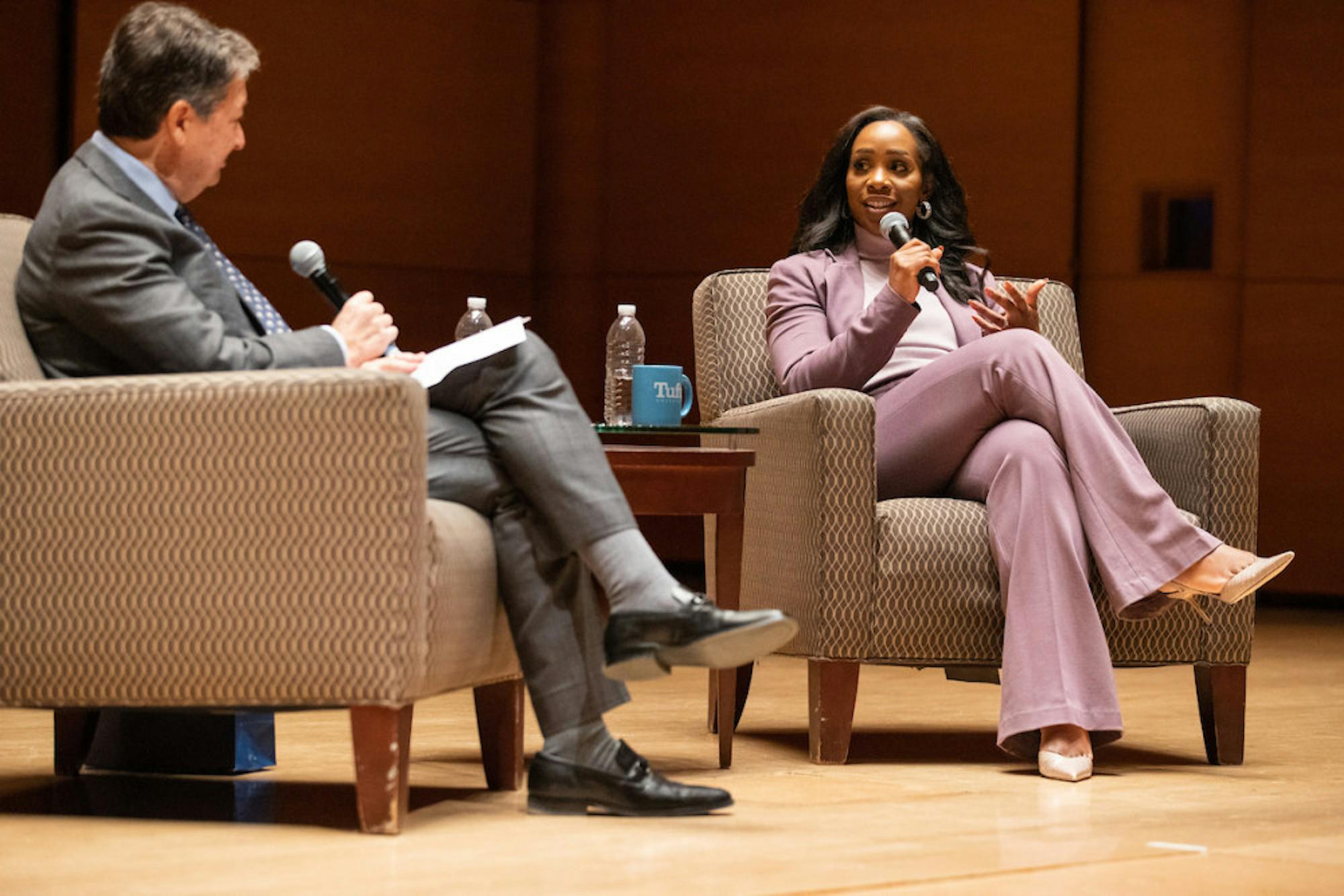Abby Phillip, CNN’s senior political correspondent and weekend anchor, was the featured guest speaker at the 15th Edward R. Murrow Forum on Issues in Journalism on April 3. Sponsored by Tisch College’s Solomont Speaker Series, the event was the first in-person Murrow Forum in four years.
Joining Phillip in conversation was Tufts trustee Neil Shapiro (LA’80), the president and CEO of WNET in New York City, the largest public media enterprise in the United States.
Phillip has previously worked at Politico, the Washington Post and ABC News, covering the White House under Presidents Barack Obama and Donald Trump. She was included in Time’s 100 Next list and received the National Urban League’s Women of Power award in 2021. Phillip graduated from Harvard University in 2010 with a bachelor’s degree in government and currently lives in Washington, D.C. with her husband and daughter.
Shapiro opened the event by asking Phillip to share her thoughts on former President Trump’s criminal indictment and its implications for the media industry.
“It is definitely unprecedented and historic in its nature — for this country — but when you take it in the broader context of this particular former president, I think that is more significant, that no other president has ever gotten to the point at which there was even sufficient evidence to bring criminal charges against them,” Phillip said.
Phillip thinks Trump’s indictment is a “wake-up call” for the country.
“In some people’s minds, this type of thing has become acceptable,” she said. “As a country, we have to decide whether or not [criminal prosecution] is something that we want to live with going into the future.”
Phillip joined CNN in 2017 to cover the events of the Trump administration as a White House correspondent. Trump wagged his finger at Phillip during a Q&A session and called her question “stupid” in 2018.
“We need to resist the urge to buy into [Trump’s] outrage machine and instead provide more facts and context,” Phillip said. “As someone who covered Trump, the repetition of the lies was sometimes mind boggling. He just would repeat them exactly the same way over and over again.”
Phillip started her career in the White House when she was just 21 years old, working for Politicoas a White House correspondent during the Obama administration.
“I kept thinking to myself, ‘What am I doing here?’” Phillip said. “The Obama White House was very traditional [and] top-down, … but it was a great place to get my start because I really learned the institution of covering the White House, which is well preserved and protected by the correspondents.”
As White House correspondent, Phillip said she experienced both the exciting and mundane parts of following presidents through their day-to-day lives. Phillip’s schedule could consist of anything from sitting in a van watching President Obama play golf to boarding Air Force One and witnessing his reactions to breaking news.
Her experiences during the Obama administration were the “most normal experience I could have gotten,” she said. “Then the Trump experience was like the exact opposite of that. It was incredibly abnormal in every possible way.”
Phillip commented that, since many of Trump’s White House employees had not been fully trained in the transition, “It was reporters like us who were telling them how it was supposed to work.”
During the Q&A portion of the event, one audience member asked Phillip if she thought the recent changes to CNN’s leadership were in any way destabilizing for the network.
“There has been a change in ownership and leadership at CNN, and a lot of things are changing,” Phillip said. “I think that’s pretty evident when you watch the network. … What I will say is that what I do hasn’t changed, and I think a lot of people feel that way.”
Asked about the importance of writing, Phillip spoke directly to young journalists, emphasizing “thick skin” as a key to thriving in the media industry.
“You have to build up your tolerance for criticism,” Phillip said. “And it’s not the indifference to criticism, it’s how you take it, you internalize it, you make changes.”
Asked how she pieces together stories from the new and complex media ecosystem, including social media, Phillip defended the role of legacy media.
“Newspapers are not dead,” Phillip said. “There’s always going to be a role for The New York Times. There’s always going to be a role for CNN. It might be a little bit less of a big role, but there’s always going to be a place for those outlets.”






